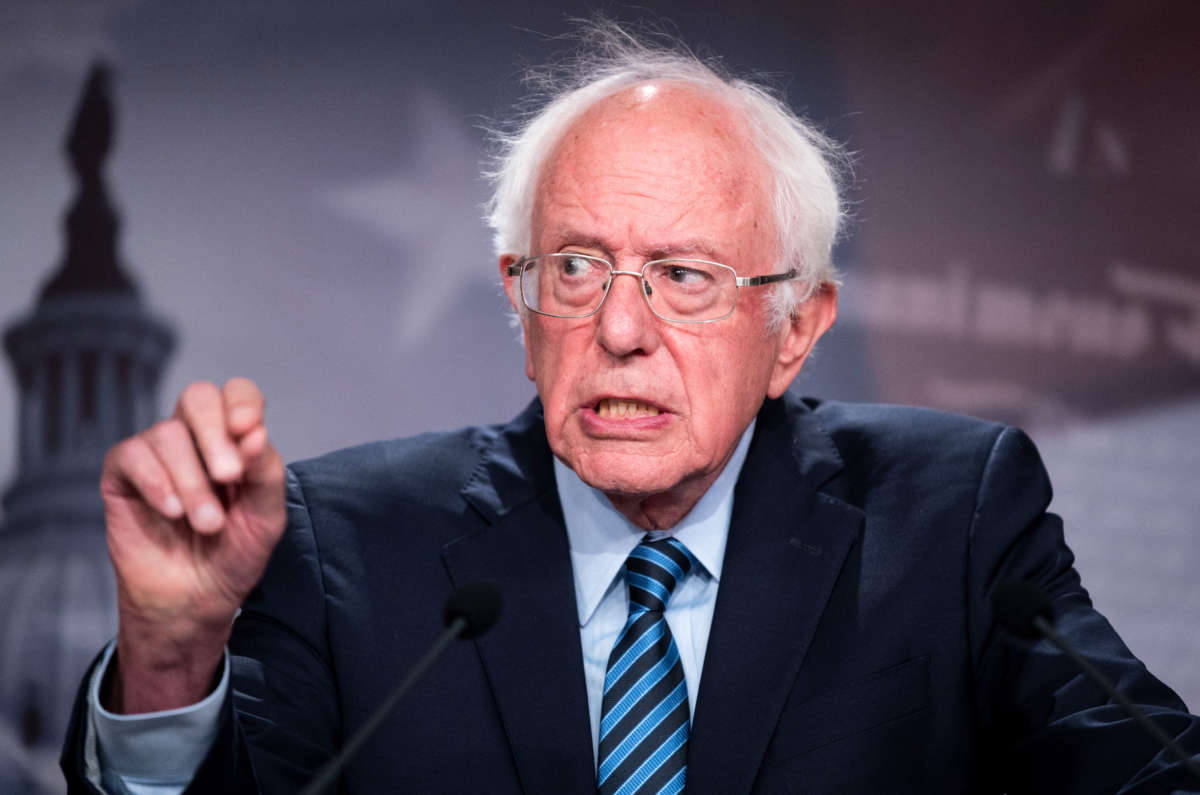In a new op-ed, Sen. Bernie Sanders (I-Vermont) touted the Democrats’ $3.5 trillion reconciliation bill as a once-in-a-generation opportunity to act on the climate crisis, reform the tax code, and provide support for a struggling working class.
“The biggest win for the working class in generations is within reach,” Sanders wrote about the bill in The Guardian.
With the wide and growing disparities between the lowest earners in the U.S. and the top 1 percent, Sanders emphasized that “now is the time” for the bill. While billionaires are able to exploit tax loopholes and low statutory tax rates to dodge taxes, sometimes entirely, millions of Americans are living paycheck-to-paycheck, the senator pointed out.
Sanders also pointed out that the bill is timely and sorely needed because of the acceleration of the climate crisis. Climate change is largely unmitigated in the U.S. and, even as just the last weeks have shown, it’s already having deadly effects and threatening the fabric of our society. “We must stand up to the greed of the fossil fuel industry, transform our energy system and lead the world in combating climate change,” Sanders said.
The Democrats’ reconciliation bill aims to tackle climate and socioeconomic issues at once. The $3.5 trillion is less than Sanders had originally proposed, but he’s said that it’s still enough to get everything he wants done, just for a shorter length of time. Democrats like Sen. Chuck Schumer (D-New York) have hailed the bill — if it passses — as the most consequential bill for the working class since the New Deal.
Sanders had a big hand in crafting the bill. It’s because of his original proposal of $6 trillion that the bill is as large and ambitious as it is, Democratic senators have said in praise. Sen. Tim Kaine (D-Virginia) called him the “human embodiment of shifting the Overton Window” on the reconciliation bill and more.
The Vermont senator wrote that the $3.5 trillion figure was reached after compromise with others in the Democratic caucus and the Budget Committee, which he chairs. He also pointed out that no Republicans will vote for the bill, which is a safe prediction.
The bill, he said, will “end the days of billionaires not paying a nickel in federal income taxes” by raising taxes on corporations and wealthy individuals. It’s an opportunity for using hoarded wealth to uplift the middle and lower classes, he wrote, saying “Under this proposal, no family making under $400,000 a year will pay a nickel more in taxes and will, in fact, receive one of the largest tax cuts in American history.”
Meanwhile, the middle and lower classes will receive a wide swath of benefits. The reconciliation bill will further extend $300 a month child tax credits, which is estimated to cut child poverty in half. Under the bill, community college will be free and pre-kindergarten will be available for every child with a universal pre-K program.
The bill takes steps to uplift the working class, Sanders pointed out. It establishes universal paid medical and family leave, “end[ing] the international disgrace of the United States being the only major country on Earth” to not guarantee such benefits. As the senator previously announced, the bill will also include provisions of the much anticipated PRO Act, which contains consequential provisions to make it easier for workers to organize and unionize.
The Democrats’ bill, which they plan to pass with a simple majority in the Senate, will also address the climate crisis with proposals like a Civilian Climate Corps and a clean energy standard; it proposes expansions to Medicare and funding for affordable housing; and opens pathways to citizenship for immigrants.
The pandemic has exaggerated nearly all of the issues that Democrats are aiming to address in the reconciliation bill, but Republicans are against nearly all of its proposals. Many of the provisions in the reconciliation bill are in fact items that GOP members have negotiated out of Joe Biden’s original infrastructure packages.
But there isn’t time to work around Republican objections, Sanders said in the op-ed. “The future of working families is at stake,” he concluded. “The future of our democracy is at stake. The future of our planet is at stake.”
Join us in defending the truth before it’s too late
The future of independent journalism is uncertain, and the consequences of losing it are too grave to ignore. To ensure Truthout remains safe, strong, and free, we need to raise $44,000 in the next 6 days. Every dollar raised goes directly toward the costs of producing news you can trust.
Please give what you can — because by supporting us with a tax-deductible donation, you’re not just preserving a source of news, you’re helping to safeguard what’s left of our democracy.
